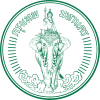Bang Khun Thian
History
Bang Khun Thian is an old district, believed to have been established in 1867 as an amphoe of Thonburi.
In 1972, Thonburi and Phra Nakhon Provinces were combined into Bangkok metropolis. Administrative units in the newly combined capital province were renamed from amphoe and tambon to "district" (khet) and "sub-district" (khwaeng). Thus, Bang Khun Thian became a district of Bangkok, composed of seven sub-districts: Bang Khun Thian, Bang Kho, Chom Thong, Bang Mot, Tha Kham, Bang Bon, and Samae Dam.
Due to population increases, a portion of Bang Khun Thian district was set up with its own district office and called Bang Khun Thian Branch 1. This new unit oversaw four sub-districts: Bang Khun Thian, Bang Kho, Bang Mot, and Chom Thong. In 1989, Bang Khun Thian Branch 1 was made a full district called Chom Thong District. In 1997, Bang Bon sub-district was separated from Bang Khun Thian and became its own district.
Economy
Bang Khun Thian, particularly its Tha Kham Sub-district, is a centre of seafood aquaculture, mostly shrimp. Most of Tha Kam's residents—70 to 80%—are aquaculture farmers and aquaculture occupies much of the district's land area. The industry is jeopardised by coastal erosion—the shoreline has retreated more than a kilometre since 1952—and since 2009, wastewater pollution has negatively impacted cultivation and farmer incomes have declined by 30–90 percent.
Administration
The district is divided into two sub-districts (khwaeng).
| No. | Name | Thai | Area (km) |
Map |
|---|---|---|---|---|
5. |
Tha Kham | ท่าข้าม | 84.712 |

|
7. |
Samae Dam | แสมดำ | 35.975
| |
| Total | 120.687
| |||
The missing numbers 1, 2, 3, 4 and 6 belong to the sub-districts which were split off to form Chom Thong and Bang Bon districts.
Places

Bang Khun Thian has Bangkok's only seashore. The coastline, about five km long, is muddy, containing mangrove forests and shrimp farms. The only way to access the Bay of Bangkok is via boat. A group of crab-eating macaque (Macaca fascicularis, Thai ลิงแสม), a kind of monkey, inhabits the coast near the sea. A fishing community is located there and the sea coast is known for its seafood restaurants.
Besides, Bang Khun Thian's mangrove forests are also the habitat for the last group of smooth-coated otters (Lutrogale perspicillata, Thai นากใหญ่ขนเรียบ) in Bangkok.

Important temples in the district include Wat Kamphaeng (วัดกำแพง), Wat Kok (วัดกก), Wat Tha Kham (วัดท่าข้าม), Wat Hua Krabue (วัดหัวกระบือ), and Wat Bang Kradi (วัดบางกระดี่).
Bang Kradi in Samae Dam is reputed to be the residence of Thai Mon people.
CentralPlaza Rama II is the main shopping mall in this district.
Taweethapisek Bangkhunthian School (a branch of Taweethapisek School) and Khlong Pittayalongkorn School are the dominant schools in the area.
References
- ^ "Population and House Report for Year 2017". Department of Provincial Administration, Ministry of Internal Affairs. Retrieved 2018-04-01. (Search page)
- ^ Marks, Danny (14 January 2020). "Capital's shrimp farmers drowning in wastewater". Opinion. Bangkok Post. Retrieved 14 January 2020.
- ^ Wancharoen, Supoj (27 March 2018). "Mangrove coast project bears fruit". Bangkok Post. Retrieved 27 March 2018.
- ^ Oeng-Oei (2019-04-30). "10 ร้านอาหารทะเล บางขุนเทียน บรรยากาศดี วิวสวย ซีฟู้ดแซ่บ" [10 seafood restaurants, good atmosphere, nice view, and yummy seafood]. Trueid (in Thai). Retrieved 2020-03-14.
- ^ "สัมผัสความน่ารัก "นาก"ฝูงสุดท้ายใน กทม" [Touch cuteness of the last otter group in Bangkok]. NEW18 (in Thai).
- ^ "วัดในพื้นที่เขตมีจำนวน 15 วัด" [There are 15 temples in the area]. Bangkok (in Thai).
- ^ Num lukthung (2007-03-27). "รู้จัก...แล้วจะรักมอญ ที่ "บ้านมอญบางกระดี่"" [Know ... and will love Mon at "Mon Bang Kradi quarter"]. Manager Daily (in Thai). Retrieved 2020-03-14.
